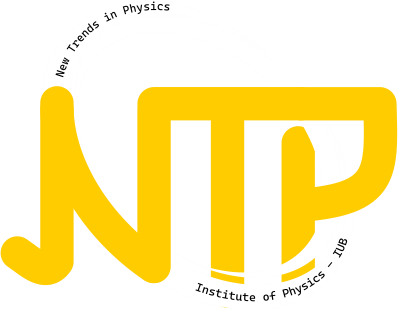Peer Review Policy
|
All research articles, and most other article types, published in New Trends in Physics undergo peer review. This usually involves review by at least two independent, expert peer reviewers. |
|
Peer review constitutes an impartial evaluation of your research paper conducted by experts within your specific field. Its primary objective is to assess the quality and appropriateness of the paper for potential publication. |
|
| Peer Review Policy |
|---|
In the realm of emerging trends in physics, all submissions undergo an initial assessment for completeness before being forwarded to an Editor for further evaluation, determining their suitability for peer review. In cases where an Editor is affiliated with the author list or possesses any conflicting interests related to a specific manuscript, an alternative member of the Editorial Board is appointed to oversee the peer review process. While Editors take into account peer-reviewed reports in their decision-making, they are not strictly bound by the opinions or recommendations provided. It's noteworthy that a concern raised by a single peer reviewer or the Editor may lead to the rejection of the manuscript. Authors are furnished with peer review reports alongside the editorial decision regarding their submission. For proceedings papers, a thorough evaluation is conducted by the Programme Chairs and Programme Committee members of the corresponding conference. External reviewers, selected by them, also contribute to this comprehensive review process.
| Peer Review Selection |
|---|
Peer reviewer selection plays a pivotal role in the publication process and is influenced by various factors, encompassing expertise, reputation, specific endorsements, conflict of interest considerations, and past performance. Desirable attributes for peer reviewers include promptness, thoroughness, sound reasoning, and collegiality. Editorial responsibilities, emphasize the expectation for editors to secure a minimum of two peer reviewers for manuscripts reporting primary research or secondary analysis. However, in certain exceptional circumstances, the editor may decide to proceed with one peer review report. Editorial decisions should be grounded in constructive, critical evaluations provided in peer review reports, particularly assessing the appropriateness of methods, accuracy of results, and support for conclusions. Editors are urged to independently verify the contact details of suggested reviewers, ensuring the use of institutional email addresses whenever possible. In instances where securing two independent peer reviewers proves challenging, the editor may act as a second reviewer, emphasizing the need for sufficient knowledge in the subject area, a transparent review signing process, detailed and thorough single reports, and the preference for the first reviewer to be a senior expert who has recently published on the subject. Potential peer reviewers are encouraged to disclose conflicts of interest before accepting an invitation to review a manuscript. Confidentiality in communications between editors and peer reviewers is paramount and should not be shared with third parties. Authors are advised against recommending recent collaborators or colleagues from the same institution. However, they can suggest peer reviewers in the cover letter, providing necessary information for the editor to verify the identity and expertise of the suggested reviewer, including institutional email addresses and ORCID or Scopus IDs.
| Diversity Among Peer Reviewers |
|---|
New Trends in Physics is dedicated to fostering diversity, equity, and inclusion within the peer review process. Editors take into account a broad range of demographic factors, including geographical regions, gender identities, racial/ethnic backgrounds, and other relevant groups when selecting peer reviewers.
| Peer Review Misconduct |
|---|
Engaging in deceptive practices, such as the submission of inaccurate information or involvement in identity theft and the introduction of fictitious peer-reviewers, will lead to manuscript rejection. Subsequent investigations aligning with NTP's misconduct policy will ensue, accompanied by notifications to the authors' institutions/employers. NTP adhere to the standards set by the Committee on Publication Ethics (COPE). Additional details regarding fraudulent activities in peer reviewing can be accessed here.
| Peer Review Guidelines |
|---|
The primary objective of peer review is to provide the Editor with information necessary for a fair, evidence-based decision aligning with the journal’s editorial criteria. Review reports aim to assist authors in refining their papers for potential publication. Reports recommending rejection should highlight major research weaknesses, aiding authors in submitting to alternative journals. Peer reviewers are expected to adhere to the ethical principles outlined in COPE's Ethical Guidelines for Peer-reviewers.
Confidential comments to the Editor are welcome but must align with the main points in the report for authors. Peer reviewers should evaluate papers solely against the journal’s publication criteria.
Adherence to the following conventions is expected:
- Reviewers should familiarize themselves with the journal's peer review policy before revealing their reviewer role.
- Objective and unbiased reviews are essential.
- Personal criticism of authors, as well as defamatory remarks, is inappropriate.
- Clear expression of views with supporting arguments and references is encouraged.
- Declaration of potential competing interests is mandatory.
- Reviewers should decline manuscripts with perceived competing interests.
- Confidentiality of supplied material should be maintained; discussing unpublished manuscripts or using information for personal work is prohibited.
- Passing a peer review invitation to a colleague requires contacting the journal first.
- Any concerns about the review process should be communicated with the editorial team.
Reviewers are asked specific questions to assess various aspects of a manuscript, including key results, validity, originality, significance, data & methodology, appropriate use of statistics, conclusions, inflammatory material, suggested improvements, references, clarity and context.
- Key Findings: Kindly summarize what you perceive as the exceptional features of the work
- Validity: Does the manuscript contain flaws that should impede its publication? If so, please furnish details.
- Originality and Significance: If the conclusions lack originality, please reference pertinent sources.
- Data & Methodology: Evaluate the validity of the approach, data quality, and presentation. Ensure a comprehensive review of all data, including supplementary information. Is the reporting sufficiently detailed for result reproduction?
- Appropriate Use of Statistics and Treatment of Uncertainties: Confirm definition of error bars in figure legends. Comment on statistical tests appropriateness and accuracy of error bars and probability values.
- Conclusions: Are the conclusions and data interpretation robust, valid, and reliable?
- Inflammatory Material: Does the manuscript contain inappropriate or potentially libelous language?
- Suggested Improvements: List suggestions to fortify the work in a revision.
- References: Does the manuscript appropriately reference previous literature? Note any necessary inclusions or exclusions, avoiding coerced citations.
- Clarity and Context: Assess the abstract's clarity and accessibility. Check if the abstract, introduction, and conclusions align appropriately.
- Expertise Limitations: Indicate any part of the manuscript, data, or analyses outside your expertise or not fully assessed.
- Specific Editor Questions: Address any additional queries posed by the editor.
- Compliance with Sex and Gender in Research: Verify adherence to guidelines on sex and gender in research (Sager Guidelines).
- Research Misconduct Alert: Notify the Editor-in-Chief/Springer Nature about allegations of publication or research misconduct.
Before submitting a report, reviewers are advised to review it for professionalism, avoiding offensive language, unnecessary personal remarks, or antagonistic comments. Reports should be thoughtful and considerate of the authors' perspective. Reports do not need to follow a specific order but should document the reviewer’s thought process, addressing all relevant aspects. Discipline-specific standards should be considered, and reviewers can contact the Editor for guidance. NTP is committed to diversity, equity, and inclusion, and reviewers are encouraged to flag any concerns affecting this commitment.
The journal is neutral regarding jurisdictional claims and naming conventions, and reviewers should refrain from requesting changes unless essential for academic clarity. Reviewers are expected to respond promptly within the agreed-upon timeframe to maintain the efficiency of the editorial process and uphold the commitment to rapid editorial decisions and publication. If delays are anticipated, reviewers should inform the editorial team promptly.
| Peer Reviewer Recognition Program |
|---|
The Peer Reviewer Recognition Program at New Trends in Physics (NTP) is designed to acknowledge and appreciate the invaluable contributions of our peer reviewers who play a pivotal role in maintaining the quality and integrity of our publication process. We understand the commitment and expertise required for thorough and constructive peer review, and we aim to honor and recognize these efforts.
Recognition Highlights
-
Appreciation Certificate: Peer reviewers who have demonstrated exceptional dedication and provided insightful feedback will receive a personalized Appreciation Certificate from NTP. This certificate serves as a formal acknowledgment of their crucial role in maintaining the high standards of our publication.
-
Exclusive Access: Peer reviewers may gain exclusive access to certain resources, events, or content that provides additional insights into the latest trends and developments in the field of physics.
-
Networking Opportunities: NTP aims to foster a community of experts. Peer reviewers may have the chance to connect with other accomplished professionals and researchers within our network, creating opportunities for collaboration and knowledge exchange.
-
Annual Recognition Event: NTP may organize an annual recognition event to celebrate and honor the peer reviewers, providing a platform for networking and appreciation.
Peer reviewers will be nominated based on the quality, timeliness, and depth of their reviews. Nominations may also consider the number of reviews conducted and the impact of the reviewer's feedback on the overall improvement of the manuscripts.
The Peer Reviewer Recognition Program reflects our commitment to acknowledging and celebrating the efforts of our dedicated reviewers. Your contributions are integral to the success of NTP, and we are grateful for your ongoing support in advancing the field of physics.


 Citation Guide
Citation Guide Submission Guide
Submission Guide Bibtex Guide
Bibtex Guide
